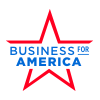Divided We Fall III: How business boosts polarization (and how it can stop)
On June 17, Business for America and the Niskanen Center presented the third Divided We Fall webinar focused on how businesses — through campaign contributions, lobbying, and other political activities — contribute to political and social polarization in America, the negative consequences, and what companies can do to reverse these harmful trends.
BFA’s Sarah Bonk and Richard Eidlin were joined by Elizabeth Doty, director of the Corporate Political Responsibility Taskforce at the Erb Institute at University of Michigan; David Clunie, executive director of the Black Economic Alliance; and Bruce Freed, president and co-founder of the Center for Political Accountability — and the author of the CPA-Zicklin Index that benchmarks the political disclosure and accountability policies and practices for election-related spending of leading U.S. public companies.
Session 4, on Tues, June 29 at 12 PM EDT, will focus on “Policy Solutions: How business can help depolarize politics and incentivize moderation.” Register for session 4 on Eventbrite »
The webinar panelists noted that Corporate Social Responsibility (CSR) efforts have now evolved to include Corporate Political Responsibility (CPR), recognizing that legal political donations and advocacy activities may contribute to a growing political divide in America and fundamentally undermine the institutions and governing capabilities that American businesses rely upon.
“One of the most critical ways companies could advance Corporate Social Responsibility is by looking at how they are politically engaged…CSR needs CPR in order to advance sustainability,” said Elizabeth Doty. She noted that corporate political activities, such as political spending, lobbying and advocacy, external communications and influence, and employee communications must have:
- Transparency — Do we disclose political activities to relevant stakeholders?
- Accountability — Are our political activities aligned with our values, purpose, and commitments to all stakeholders?
- Responsibility — Do our political activities support the systems on which markets, society, and life depend?
Bruce Freed added, “If companies choose to spend politically, they need to do it transparently, they need to do it with accountability, and they need to pay very close attention to the impact of the spending and what it associates the company with. And that is even more important today as we have had the issues of racial justice in the forefront, as we have had the attack on democracy and the insurrection at the Capitol on January 6.”
Mr. Freed offered the CPA-Wharton Zicklin Model Code of Conduct for Corporate Political Spending as a framework for companies on how they approach their decision-making, how they look at their political spending, and how they evaluate the spending.
David Clunie suggested that standing by a core set of values will help companies protect against situations where they are responding to incidents that pull them in different directions. “There are some cases where the leadership of a company can speak in their personal right and end up speaking on behalf of the corporation. Sometimes, their personal opinion is at odds with the rest of the organization. So it forces consensus building inside of an organization and it forces organizations to look at any given set of circumstances against their set of principles to figure out, ‘How does this align or not, and how do we process these requests that are coming in and these competing interests, against our core set of principles?’”
